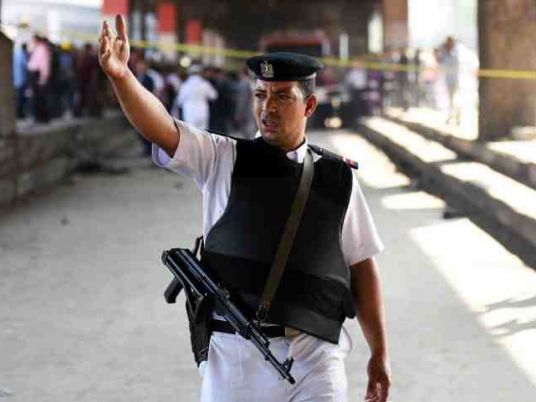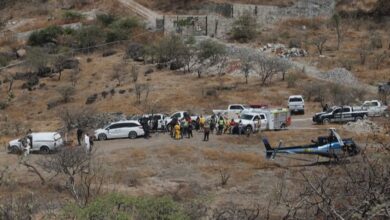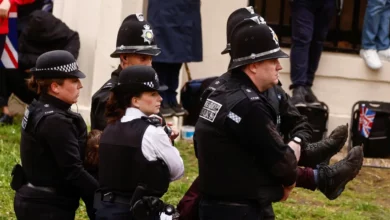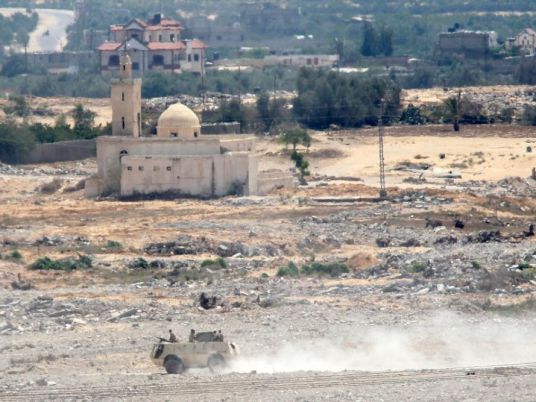On the outskirts of Maadi neighborhood, where much of Cairo’s wealthy elite resides, lies a much poorer area called Arab al-Maadi, where 24 martyrs died demanding freedom – yet their relatives feel their memories have not been properly honored.
According to testimonies of residents, most of the 24 martyrs were killed in what they call “the battle of Dar al-Salam police station” on 28 January, the deadliest day of the 18-day uprising that led to the toppling of former President Hosni Mubarak.
The issue of forgotten martyrs has been brought to public attention just recently, with the families of martyrs staging an open-ended sit-in outside Cairo’s radio and television building on the Maspero corniche. The families are calling for immediate and transparent justice, demanding that those responsible for killing protesters during the uprising be tried and sentenced.
Ahmad Abdel Hakim
Sayed Abdel Hakim lives in a one-room apartment with his wife and two daughters. He fishes out a key and unlocks a big blue box, in which he stores all of his late brother Ahmed's belongings.
As he takes out pictures, Sayed tells the story of Ahmed’s death on 28 January, the so-called "Friday of Anger". According to Sayed, his brother, 39, received a bullet in his waist while carrying wounded protesters to the hospital. He was shot close to Maadi police station.
“Ahmed was not into politics and he was not protesting. He just went to help his friends after he heard gunshots and saw that people were being killed,” said Sayed.
Sayed believes his brother has not received the recognition that he deserves for dying a martyr, nor has his death been properly commemorated.
“Neither the government nor the Supreme Council of the Armed Forces (SCAF) did anything to honor the memory of my brother and the other martyrs,” said Sayed. “The state owes a lot to those martyrs who changed the country.”
Sayed complained that the revolution hasn’t changed injustice against the poor that existed in Egypt before 25 January.
“No one knows or remembers anything about the martyrs who died in the poor areas, but if my brother was from the more affluent areas of Zamalek or Heliopolis, he would have received much more recognition,” said Sayed with a broken voice and tearful eyes.
Sayed added that people don’t know anything about these 24 martyrs, unlike those who were in Tahrir and whose pictures and names always appear on television. The images of certain martyrs, mostly young professionals from middle-class backgrounds, became a brand of the 25 January revolution as they went viral on the city’s walls, the pages of newspapers and many other platforms.
“We don’t have a voice because we’re buried in this place, and I don’t have the financial ability to keep running after newspapers and television channels like other people do,” said Sayed.
Sayed said he wants people to always remember and honor his brother’s name. For him, popular remembrance of those martyrs is the only way to immortalize them.
“I want the square at the end of the street to be named after my brother,” he said.
Sayed printed 2000 copies of Ahmed’s picture and hung them around the neighborhood. Ahmed’s friends cleaned up the square near his house and decided to informally name it “Martyr Ahmed Abdel Hakim.”
Ali Nabil Abdel Samea
Ali Nabil Abdel Samea, 27, is another martyr from Arab al-Maadi who died on 28 January, which happened to be his birthday. He received a bullet to his neck while protesting near Dar al-Salam police station.
Ali’s brother, Hosny, wants their street be named after Ali. Otherwise, he is afraid time will pass by and no one will remember his brother. Hosny said he regularly goes to the place where his brother was killed and prays for him.
“Nobody cares about the martyrs but their families,” said Hosny.
Hosny added that he put his brother’s picture in all the houses of his relatives. He also ordered a batch of custom-made leather wallets bearing his brother’s name, to be distributed among his friends and neighbors.
Ahmad Samir
Arzaq Abdel Halim is the mother of 28-year-old Ahmed Samir, who was shot in the chest near Dar al-Salam police station. Samir, who graduated from Al-Azhar University and was a worker in a cement company, used to write poems, which were discovered by Abdel Halim only after he died.
“I didn’t know he had all of these pent-up feelings of anger inside of him,” said Abdel Halim in tears.
Ahmed wrote about the revolutions in Tunisia and Egypt, and just before going joining the protests on 28 January, he finished his final poem, which depicted the events of 25 January and was entitled “Before the end.”
“All I’m asking is that his poem be published in order for all Egyptians to read the words,” said Abdel Halim.
A month ago, a Cairo Opera House concert, in which a large number of artists performed to commemorate martyrs and those wounded during the revolution, was held. However, the families of Arab al-Maadi were not invited.
Official reports say 846 people died and over 6000 were injured during the 18-day uprising. However, local rights groups estimate the number of killed at about 1500. The majority, it seems, are simply faceless victims amid millions of people.
In an op-ed published by the Al-Shorouk daily last week, activist Alaa Abdel Fattah said that the martyrs were the driving force behind the revolution. “Celebrate the martyrs, for amidst ideas, symbols, stories, spectacles and dreams, nothing is real but their blood and nothing is guaranteed but their eternity,” he said.
Before the End
Long live the revolution
Through the actions and blood of men
Swords removed from their sheaths
By the hunger of children
By the cry of a mother late at night
Calling on the Transcendent Lord for help
By a bereaved father
By the flagrant oppression of scoundrels
Nights veil a million moans
Searching for work in the morn
For food and for clothes
In a country filled with water
And a rapidly flowing Nile
Knocking at the door of those in power
Who reap the harvest
Sowed by the masses of bastards
Who have no joy
Other than the occasional visit to destitute harlots
Brown-nosers unite
Shouting don’t go, stay
The young Rebel declares
I follow Mohamed
(Peace be upon him)
Mohammed, the ultimate leader
A fearless warrior
Imagine you brown-nosers
If our Mohamed was alive
Would he accept the export of gas?
Would he close the border crossing in the face of our brothers?
These will remain mysteries
You, I will not follow, I will not understand
My shoe is better than you
My mind exposes your failures
Starting today I have decided
To participate in all
Which you have declared wrong
Civil disobedience and boycotts
Protests and demonstrations
So return to reason
You Quadruped
For if you decline, then in my mind
You are nothing more than scybalum
By the martyr Ahmed Samir al-Sayed
The martyrs of Arab al-Maadi
1. Ali Nabil Abdel Samea
2. Ahmed Mohamed Abdel Hakim
3. Islam Ibrahim
4. Mahmoud Khafaga
5. Islam Raafat
6. Khaled Attia
7. Mohamed Abdel Aal
8. Ahmed Helal
9. Ahmed Samir
10. Amr al-Barbary
11. Mansour Abdel Latif
12. Mohamed Abo Ghanima
13. Mansour Fathy
14. Hadeer Adel Soliman




